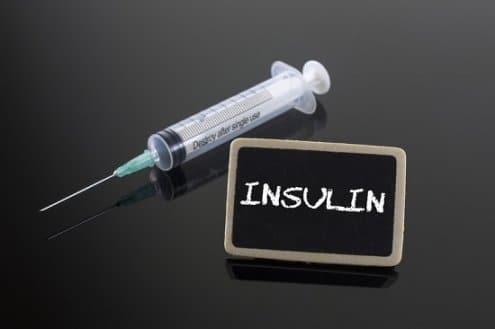Insulin is a hormonal protein that is associated with the regulation of metabolism. This hormone secreted by beta-cells of the pancreas affects the metabolism of not only carbohydrates (sugar) but also protein and fats metabolism equally. It is primarily related to the storage of energy and growth. Insulin causes excess carbohydrates to be stored as glycogen, mainly in the liver and muscles, in case they are in excess. Moreover, insulin’s stimulus, all the additional carbohydrates that cannot be stored as glycogen are converted into fats and stored in adipose tissue.
Moreover, Insulin has a directly affects in promoting amino acid uptake by cells and conversion of these amino acids into proteins. Besides, it inhibits the breakdown of proteins that are already in the cells.
Biosynthesis:
The β-cells of the islets of Langerhans of the pancreas produce insulin. Its synthetic gene is located on chromosome 11. Two precursors are involved in insulin synthesis, namely pre-pro-insulin with 108 amino acid (mol. wt. 11,500) and pro-insulin with 86 amino acids (mol. wt. 9,000). Active hormone insulin is formed by their direct degradation and a connecting peptide (C-peptide). Insulin and C-peptide, both are produced in equimolar concentration. C-peptide estimation in the plasma serves as a useful index for the endogenous production of insulin, yet it serves no useful biological activity.
In the p-cells, insulin (and also pro-insulin) combine with zinc to form complexes. In this form, insulin is stored in granules of the cytosol in this form and are released in response to various stimuli (discussed below) by exocytosis.
Regulation of insulin secretion:
About 40-50 micro-units of insulin are secreted daily by the human pancreas. Normally its plasma concentration is 20-30 µU/ml. Some of the factors that influence the release of insulin from the β-cells of the pancreas are briefly given below.
Factors stimulating insulin secretion:
These include glucose, amino acids, and gastrointestinal hormones.
- Glucose is an important stimulant for insulin release. The effect is more predominant when glucose is administered orally (either directly or through a carbohydrate-rich meal). Rise in blood glucose stimulates insulin secretion from pancreatic beta cells.
- Amino acids induce the secretion of insulin. It is observed as after protein rich food intake that caused a transient rise in plasma amino acid concentration. Other stimulators of insulin secretion are the amino acids, arginine, and leucine.
- Gastrointestinal hormones (secretin, gastrin, pancreozymins) enhance the secretion of insulin. The GIT hormones are released in response to food intake.
Factors inhibiting insulin secretion:
The most potent inhibitor of insulin release is epinephrine. Nervous system stimulates the adrenal medulla to release epinephrine in emergencies like extreme exercise, trauma or stress. Epinephrine suppresses insulin release and promotes energy metabolism by mobilizing energy-yielding compounds, glucose from the liver, and fatty acids from adipose tissue.
—
Disclaimer: Please note that the contents of this community article are strictly for informational purposes and should not be considered as medical advice. This article, and other community articles, are not written or reviewed for medical validity by Canadian Insulin or its staff. All views and opinions expressed by the contributing authors are not endorsed by Canadian Insulin. Always consult a medical professional for medical advice, diagnosis, and treatment.


